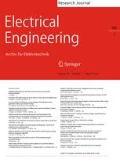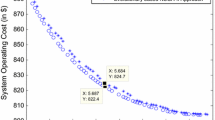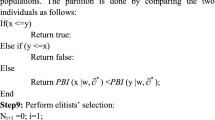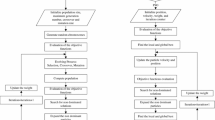Abstract
In this paper, a new multi-objective approach is suggested, known as multi-objective backtracking search algorithm (MOBSA) in order to formulate and solve the optimal power flow (OPF) problem in power systems. Many objective functions are considered like fuel cost, power losses, and voltage deviation. The structure of the proposed method is simple and has one control parameter. In addition, MOBSA is able to solve the highly constrained objectives. A fuzzy membership technique is integrated into the BSA algorithm to extract the best compromise solution from all the obtained Pareto optimal solutions. Furthermore, the capability of the MOBSA approach is evaluated and verified for bi- and tri-objectives, and tested on three standard IEEE power systems, small network 30-bus, medium network 57-bus, and large network 118-bus test systems. The obtained results reveal that the proposed method is efficient to generate well-distributed Pareto optimal non-dominated solutions. Likewise, the comparison analysis with some re-implemented methods as MODE, SPEA, MALO, and those found in the literature as MOABC/D, QOTLBO, NSGA-II and NSMOGSA, assured the superiority, effectiveness, and robustness of MOBSA.












Similar content being viewed by others
Abbreviations
- \(a_i\), \(b_i\), \(c_i\) :
-
Cost coefficients of the \(i^{th}\) generator
- BCS :
-
Best compromise solution
- \(B_{ij}\) :
-
Susceptance of the admittance matrix
- D :
-
Dimension
- f(x, u):
-
Objective function
- F :
-
Scale factor
- \(F_C\) :
-
Fuel cost
- \(G_{ij}\) :
-
Conductance of the admittance matrix
- g(x, u):
-
Equality constraints
- histPop :
-
Historical population
- h(x, u):
-
Inequality constraints
- low :
-
Lower limits of problem
- N :
-
Population size (the number of individuals)
- OPF :
-
Optimal power flow
- \(P_{gi}\), \(P_{di}\) :
-
Active and reactive power generated at \(i^{th}\) unit
- \(P_{loss}\) :
-
Power losses
- Pop :
-
Population
- \(Q_C\) :
-
Shunt VAR compensation
- \(Q_{gi}\), \(Q_{di}\) :
-
Active and reactive power generated at \(i^{th}\) unit
- \(S_{li}\) :
-
Apparent power flow of \(i^{th}\) line
- \(T_i\) :
-
Tap settings of regulating transformer i
- \(T_{i,j}\) :
-
Trial population
- u :
-
Vector of independent variables or control variables
- up :
-
Upper limits of problem
- VD :
-
Voltage deviation
- \(V_{gi}\) :
-
Voltage magnitudes at \(i^{th}\) PV buses
- \(V_{li}\) :
-
Voltage magnitude at load bus i
- x :
-
Vector of dependent variables or state variables
- \(\mu _{fi}\) :
-
Membership function of \(i^{th}\) objective
- \(\theta _i\) :
-
Voltage angles at \(i^{th}\) bus
- BSA:
-
Backtracking search algorithm
- MALO:
-
Multi-objective ant lion optimization
- MDE:
-
Multi-objective differential evolution
- MICA3:
-
Modified imperialist competitive algorithm
- MOABC/D:
-
Multi-objective artificial bee colony algorithm based on decomposition
- MODE:
-
Multi-objective differential evolution
- MOO:
-
Multi-objective optimization
- NSMOGSA:
-
Non-dominated sorting multi-objective gravitational search algorithm
- NSGA II:
-
Non-dominated sorting genetic algorithm
- SPEA:
-
Strength Pareto evolution algorithm
- QOTLBO:
-
Quasi-oppositional teaching learning-based optimization
References
Dommel HW, Tinney WF (1968) Optimal power flow solutions. IEEE Trans Power Syst 87(10):1866–1876
Syai’in M, Soeprijanto A (2012) Improved algorithm of Newton Raphson power flow using GCC limit based on neural network. Int J Electr Comput Sci 12(1):7–12
Al Ameri A, Nichita C, Dakyo B (2014) An efficient algorithm for power load flow solutions by schur complement and threshold technique. Int J Adv Res Electr Electrical Inst Eng 3(8):11062–11069
Singhal K (2014) Comparison between load flow analysis methods in power system using MATLAB. Int J Sci Eng Res 5(5):1412–1419
Habibollahzadeh H, Luo GX, Semlyen (1989) A Hydrothermal optimal power flow based on a combined linear and nonlinear programming methodology. IEEE Trans Power Syst 4(2):530–537
Aoki K, Nishikori A, Yokoyama RT (1987) Constrained load flow using recursive quadratic programming. IEEE Trans Power Syst 2(1):8–16
Momoh JA, Zhu JZ (1999) Improved interior point method for OPF problems. IEEE Trans Power Syst 14(3):1114–1120
Salgado RS, Schiochet AF, Barboza LV (2010) Multi-objective optimal power flow solutions through a parameterized model. In: Eighth world energy system conference, Valahia, Romania
Hayyolalam V, Pourhaji Kazem AA (2020) Black Widow Optimization Algorithm: a novel meta-heuristic approach for solving engineering optimization problems. Eng Appl Artif Intell 87:103249
Mirjalili S, Gandomi AH, Mirjalili SZ, Saremi S, Faris H, Mirjalili SM (2017) Salp Swarm algorithm: a bio-inspired optimizer for engineering design problems. Adv Eng Softw 114:163–191
Kamboj VK, Nandi Y, Bhadoria A, Sehgal S (2020) An intensify Harris hawks optimizer for numerical and engineering optimization problems. Appl Soft Comput 89:106018
Dhawale D, Kamboj VK (2020) hHHO–IGWO: A new Hybrid Harris Hawks optimizer for solving global optimization problems. International Conference on Computation, Automation and Knowledge Management (ICCAKM) 19495342
Hashim FA, Houssein EH, Mabrouk MS, Al-Atabany W, Mirjalili S (2019) Henry gas solubility optimization: A novel physics-based algorithm. Future Gener Comput Syst 101:646–667
Bhadoria A, Kamboj VK (2018) Optimal generation scheduling and dispatch of thermal generating units considering impact of wind penetration using hGWO-RES algorithm. Appl Intell 49(4):1517–1547
Weiguo Z, Zhang Z, Wang L (2020) Manta ray foraging optimization: an effective bio-inspired optimizer for engineering applications. Eng Appl Artif Intell 87:103300
Abou El Ela AA, Abido MA, Spea SR (2011) Differential evolution algorithm for optimal reactive power dispatch. Electr Power Syst Res 81(2):458–464
Suresh V, Sreejith S, Sudabattula SK, Kamboj VK (2019) Demand response-integrated economic dispatch incorporatingrenewable energy sources using ameliorated dragonfly algorithm. Electr Eng 101(2):421–442
Abuella M, Hatziadoniu J (2016) Selection of most effective control variables for solving optimal power flow using sensitivity analysis in particle swarm algorithm. arXiv:1601.04150
Allaoua B, Laouafi A (2008) Collective intelligence for optimal power flow solution using ant colony optimization. Electr J Pract Tech 7(13):88–105
Wankhade CM, Vaidya AP (2012) Optimal power flow evaluation of power system using genetic algorithm. Int J Power Syst Oper Energy Manag 1(4):2231–4407
Ara AL, Kazemi A, Behshad M (2013) Improving power systems operation through multi-objective optimal location of optimal unied power ow controller. Turk J Electr Eng Comput Sci 21:1893–1908
Narimani MR, Azizipanah-Abarghooee R, Zoghdar-Moghadam-Shahrekohne B, Gholami K (2013) A novel approach to multi-objective optimal power flow by a new hybrid optimization algorithm considering generator constraints and multi-fuel type. Energy 49(1):119–136
Sulaiman MH, Mustaffa Z, Mohamed MR, Aliman O (2015) Using the gray wolf optimizer for solving optimal reactive power dispatch problem. Appl Soft Comput 32:286–292
Attia AF, El Sehiemy RA, Hasanien HM (2018) Optimal power flow solution in power systems using a novel Sine-Cosine algorithm. Int J Electr Power Energy Syst 99:331–343
Ghaemi S, Aghdam FH, Safari A, Farrokhifar M (2019) Stochastic economic analysis of FACTS devices on contingent transmission networks using hybrid biogeography-based optimization. Electr Eng 101:829–843
Khorsandi A, Hosseinian SH, Ghazanfari A (2013) Modified artificial bee colony algorithm based on fuzzy multi-objective technique for optimal power flow problem. Electr Power Syst Res 95:206–213
Shang R, Wang J, Jiao L, Wang Y (2014) An improved decomposition-based memetic algorithm for multi-objective capacitated arc routing problem. Appl Soft Comput 19:343–361
Liang RH, Wu CY, Chen YT, Tseng WT (2015) Multi-objective dynamic optimal power flow using improved artificial bee colony algorithm based on Pareto optimization. Int Trans Electr Energy Syst 26(4):692–712
Medina AM, Das S, Carlos ACC, Ramirez MJ (2014) Decomposition-based modern metaheuristic algorithms for multi-objective optimal power flow a comparative study. Eng Appl Artif Intel 32:10–20
Ghasemi M, Ghavidel S, Ghanbarian MM, Gitizadeh M (2015) Multi-objective optimal electric power planning in the power system using Gaussian bare-bones imperialist competitive algorithm. Inf Sci 294:286–304
Yuan X, Zhang B, Wang P, Ji L, Yuan Y, Huang Y, Lei X (2017) Multi-objective optimal power flow based on improved strength Pareto evolutionary algorithm. Energy 122:70–82
Warida W, Hizama H, Mariuna N, Wahaba NIA (2018) A novel quasi-oppositional modified Jaya algorithm for multi-objective optimal power flow solution. Appl Soft Comput 65:360–373
Zhanga J, Tang Q, Li P, Deng D, Chen Y (2016) A modified MOEA/D approach to the solution of multi-objective optimal power flow problem. Appl Soft Comput 47:494–514
Sivasubramani S, Swarup K (2011) Multi-objective harmony search algorithm for optimal power flow problem. Int J Electr Power Energy Syst 33:745–752
Rahmati M, Effatnejad R, Safari A (2014) Comprehensive Learning Particle Swarm Optimization (CLPSO) for Multi-objective Optimal Power Flow. Indian J Sci Tech 7(3):262–270
Barocio E, Regalado J, Cuevas E, Uribe F, Zúñga P, Torres PJR (2017) Modified bio-inspired optimisation algorithm with a centroid decision making approach for solving a multi-objective optimal power flow problem. IET Gener Trans Distri 11(4):1012–1022
Abido MA, Al-Ali NA (2012) Multi-Objective Optimal Power Flow Using Differential Evolution. Arab J Sci Eng 37:991–1005
Shaheen AM, Farrag SM, El-Sehiemy RA (2017) A Novel Multi-Objective Optimal Power Flow Solution Methodology. IET Proceedings Gener Trans Distrib 11(2):570–581
Pulluri H, Naresh R, Sharma V (2017) An Enhanced Self-adaptive Differential Evolution Based Solution Methodology for Multiobjective Optimal Power Flow. Appl Soft Comput 54:229–245
Shaheen AM, El-Sehiemy RA, Farrag SM (2015) Solving multi-objective optimal power flow problem via forced initialised differential evolution algorithm. IET Gener Trans Distrib 10(7):1634–1647
Ghasemi M, Ghavidel S, Ghanbarian MM, Massrur HR, Gharibzadeh M (2014) Application of imperialist competitive algorithm with its modified techniques for multi-objective optimal power flow problem: a comparative study. Inf Sci 281:225–247
Civicioglu P (2013) Backtracking search optimization algorithm for numerical optimization problems. Appl Math Comput 219(15):8121–8144
Chatzipavlis A, Tsekouras GE, Trygonis V, Velegrakis AF, Tsimikas J, Rigos A, Hasiotis T, Salmas C (2019) Modeling beach realignment using a neuro-fuzzy network optimized by a novel backtracking search algorithm. Neural Comput Appl 31:1747–1763
Ahandani MA, Ghiasi AR, Kharrati H (2018) Parameter identification of chaotic systems using a shuffled backtracking search optimization algorithm. Soft Comput 22:8317–8339
Lu J, Ding J (2019) Construction of prediction intervals for carbon residual of crude oil based on deep stochastic configuration networks. Inf Sci 486:119–132
Khan WU, Ye Z, Chaudhary NI, Raja MAZ (2018) Backtracking search integrated with sequential quadratic programming for nonlinear active noise control systems. Appl Soft Comput 73:666–683
Thai V, Cheng J, Nguyen V, Daothi P (2019) Optimizing SVM’s parameters based on backtracking search optimization algorithm for gear fault diagnosis. J Vibroeng 21(1):66–81
Sriram M, Ravindra K (2020) Backtracking Search Optimization Algorithm Based MPPT Technique for Solar PV System. in: Adv Decis Sci, Image Process, Secur Comput Vis, Springer 498–506
Abdolrasol MGM, Hannan MA, Mohamed A, Amiruldin UAU, Abidin IBZ, Uddin MN (2018) An optimal scheduling controller for virtual power plant and microgrid integration using the binary backtracking search algorithm. IEEE Trans Ind Appl 54:2834–2844
Shaheen AM, El-Sehiemy RA, Farrag SM (2016) Optimal reactive power dispatch using backtracking search algorithm. Aust J Electr Electron Eng 13:200–210
Chaib AE, Bouchekara H, Mehasni R, Abido MA (2016) Optimal power flow with emission and non-smooth cost functions using backtracking search optimization algorithm. Int J Electr Power Energy Syst 81:64–77
El-Fergany A (2016) Multi-objective allocation of multi-type distributed generators along distribution networks using backtracking search algorithm and fuzzy expert rules. Electric Power Compon Syst 44(3):252–267
Lin J (2019) Backtracking search based hyper-heuristic for the flexible job-shop scheduling problem with fuzzy processing time. Eng Appl Artif Intell 77:186–196
Badawy MM, Ali ZH, Ali HA (2019) QoS provisioning framework for service-oriented internet of things (IoT). Cluster Comput 1–17
Zadeh LA (1965) Fuzzy sets. Information and Control 8:338–353
Bellman R, Zadeh LA (1970) Decision-making in a fuzzy environment. Manage Sci 17:141–164
Alsac O, Stott B (1974) Optimal load flow with steady-state security. IEEE Trans Power Apparatus Syst 93(3):745–751
Zimmerman RD, Murillo-Sánchez CE, Thomas, RJ, Matpower Available at: http://www.pserc.cornell.edu/matpower
Bhowmik AR, Chakraborty AK (2014) Solution of optimal power flow using non-dominated sorting multi objective gravitational search algorithm. Int J Electr Power Energy Syst 62:323–334
Mandal B, Roy PK (2014) Multi-objective optimal power flow using quasi-oppositional teaching learning based optimization. Appl Soft Comput 21:590–606
Wolpert DH, Macready WG (1997) No free lunch theorems for optimization. Evol Comput IEEE Trans 1:67–82
Author information
Authors and Affiliations
Corresponding author
Ethics declarations
Conflict of interest
The authors declare that they have no conflict of interest.
Additional information
Publisher's Note
Springer Nature remains neutral with regard to jurisdictional claims in published maps and institutional affiliations.
Rights and permissions
About this article
Cite this article
Daqaq, F., Ouassaid, M. & Ellaia, R. A new meta-heuristic programming for multi-objective optimal power flow. Electr Eng 103, 1217–1237 (2021). https://doi.org/10.1007/s00202-020-01173-6
Received:
Accepted:
Published:
Issue Date:
DOI: https://doi.org/10.1007/s00202-020-01173-6




